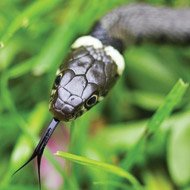
Amphibian and Reptile Conservation call on gardeners to report snake sightings via online survey
National wildlife charity, Amphibian and Reptile Conservation (ARC), is calling on gardeners to report if they have spotted a snake in their garden this summer.
The long, hot summer has brought a record number of snake enquiries to ARC - most of which have been grass snakes, which are harmless to people and pets. ARC are now asking gardeners across Britain to report snake sightings, using a simple online survey.
ARC has released new advice to help gardeners with their snake queries and, following a series of horrific incidents, they are also also urging gardeners to make their gardens “snake-safe” by cutting down on particular types of netting that can be a danger to the animals.
Naturalist and broadcaster, Chris Packham, one of ARC's patrons, said: "Snakes are amongst the most beautiful wildlife that we have but sadly all three of the UK species are in trouble. So if one turns up in your garden, it's a treat - try to make it feel at home by making a pond or compost heap, and be very careful with any netting you use over the pond or your peas as snakes can become fatally entangled."
ARC's conservation director, Jim Foster, added: "We’d like people to let us know if they’ve spotted a snake in their garden this summer. All sightings are useful: we know that snake habitat in the countryside is vanishing, yet gardens could be a backyard back-up plan for grass snakes. Gardeners can use our advice to boost local snake numbers.”
ARC are a national wildlife charity committed to conserving amphibians and reptiles and saving the disappearing habitats on which they depend.
To take part in the survey visit: www.arc-trust.org/summer-snakes
Image (C) Thomas Brown



 The Greyhound Board of Great Britain has published new vaccination guidance, with all greyhounds registered from 1 January, 2027 required to have the L4 leptospirosis vaccination, rather than L2.
The Greyhound Board of Great Britain has published new vaccination guidance, with all greyhounds registered from 1 January, 2027 required to have the L4 leptospirosis vaccination, rather than L2.